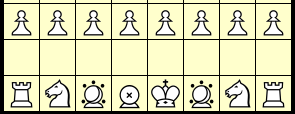[ List Earliest Comments Only For Pages | Games | Rated Pages | Rated Games | Subjects of Discussion ]
Single Comment
 H. G. Muller wrote on Thu, Aug 9, 2012 09:31 PM UTC:
H. G. Muller wrote on Thu, Aug 9, 2012 09:31 PM UTC:
Check out Makruk (Thai Chess), our featured variant for March, 2025.
 H. G. Muller wrote on Thu, Aug 9, 2012 09:31 PM UTC:
H. G. Muller wrote on Thu, Aug 9, 2012 09:31 PM UTC: